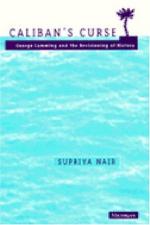|
This section contains 3,884 words (approx. 13 pages at 300 words per page) |

|
SOURCE: “Freedom after the Fall: Renaissance and Disillusionment in Water with Berries and Guerrillas,” in Individual and Community in Commonwealth Literature, University Press, 1979, pp. 90-8.
In the following essay, Tiffin explores the interactions among characters in Lamming's Water with Berries and V. S. Naipaul's Guerrillas.
In A House for Mr. Biswas V. S. Naipaul in what now seems to have been an aberrant moment of optimism, pointed the way to a West Indian self acceptance and hence a personal freedom to legitimize the achieved political one. As Robertson has observed, in post-colonial literatures the pattern of the Edenic myth is generally inverted and the attainment of freedom, the true creation of new man, is a post-lapsarian condition.1 The post-lapsarian freedom indicated in A House for Mr. Biswas was a posture of compromise; the acceptance of a less than paradisal condition in the West Indian present after the rejection...
|
This section contains 3,884 words (approx. 13 pages at 300 words per page) |

|


